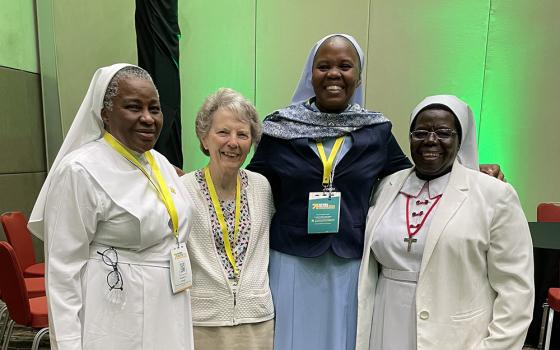
(Unsplash/Soumik Mondal)
On my way back to the community, I saw that she was walking fast and said casually, "What's up, in a hurry today?"
"Yeah, have to accompany my mom to the clinic" she replied.
Well, this brief encounter with the girl on the roadside enlightened me. The word accompany caught my attention and became the focal point for my reflection.
Two key words played an important role, my brief encounter with the girl and her powerful response: accompany my mom ...
In my childhood, there was someone who always accompanied in all circumstances — none other than my mother. If we are lucky, all of us are accompanied by our mothers. On our journey of religious life too, we have Mary our Mother, the model of accompaniment.
Mary our Mother is the source of inspiration and the model of accompaniment in our journey as consecrated women. The beautiful episodes in the Bible about Mary's accompaniment are indeed a motivation for us even in the most trying times never to give up — especially Mary accompanying Jesus to accomplish his mission!
Throughout salvation history, God accompanied his people — Abraham, Moses, Joseph the son of Jacob. God himself is the first model of accompaniment.
In Evangelii Gaudium, Pope Francis invites all Christians "to a renewed personal encounter with Jesus Christ." We do have personal encounters with Jesus through our service, sacraments, the Scriptures, prayer, and much more through our relationships — yes, interpersonal relationship of love with one another.
A beautiful example of Jesus with the two disciples on the road to Emmaus allowed them to experience this love. The hearts of the two crestfallen disciples were empty, heavy with grief, wounded by disappointment, and numb with pain. Just then Jesus made himself present to them — in other words, accompanied them with tenderness and compassion on their journey.
The words encounter and accompany are two sides of the same coin. They coexist and are indispensable, incomplete one without the other, though the intensity of both the encounter and undoubtedly the accompaniment may differ. It can be deeper or superficial, depending on our likes and our art of accompaniment.
When I say art of accompaniment, in our daily life we meet and encounter people as we travel, at social gatherings, at our workplace or outreach programs and seminars. Some encounters are shallow, a few are deep, and in some, we walk side by side — not ahead nor behind — which allows the other to be whoever they are; and in a word, accepting the other person with all their goodness and limitations.
I was moved by this sentence that I read somewhere: The art of accompaniment is as if we removed our sandals before the sacred ground of the other.
And Evangelii Gaudium reminds us: "The pace of this accompaniment must be steady and reassuring, reflecting our closeness and our compassionate gaze which also heals, liberates and encourages growth in the Christian life."
I said an encounter need not be deep. I had this experience: Once, on my way to the market, I met someone I didn't know well, just by name, and said: "Hi, how are you?" And this person — instead of replying in the affirmative, I am OK, thank you — told me about her ailments for 15 minutes. Finally, I got uncomfortable, became restless, kept looking at my watch and left, promising to pray for her!
Advertisement
I had another experience while working in the missions of Sindhudurg, Maharashtra, India: I was visiting a village in the outskirts of Sindhudurg. I kept trying to visit a family even when others spoke ill of them — even my own sisters in the community made sour faces.
I visited them often, and my efforts led two brothers to open up their life journey. Like the two disciples of Emmaus — who said, "Were not our hearts burning when he spoke to us?" — they said to me, "Sister, nobody spoke to us like this, as you did. See, I get goose bumps and the movement in my heart stirs to listen to you."
After five months of empowering and encouraging them to encounter Christ by listening to the word of God and receiving the sacraments, they went to confession and participated in the Eucharist after two decades away from the church. I can still visualize the joy on their faces after receiving the sacrament of confession.
So, accompanying is walking at the pace of another. It is precisely the other person who leads the walk and we are happy to stay close, to give support, making our presence felt to encourage, motivating them when they are weary, lost and neglected, and mediating to help them overcome failures.
As I remember someone beautifully saying: "Accompaniment is a word that contains our joy-filled wonder at moments and at relationships that shine with God's grace."
St. Augustine wrote, "It is solved by walking." No doubt accompaniment bears fruit when we truly walk the road together and try to get to know one another. Through accompaniment, we help to guide the person to decide for themselves, and do not impose our decisions.
In our own journeys, we need accompaniment at different times of life and in different circumstances. In our spiritual journey, the accompaniment we get from our spiritual directors or confessors is different from that we get from community members. Some sisters who need accompaniment — especially in times of trials or loneliness or when falsely accused — have fallen prey to poor counselors, and left the community or even committed suicide.
Well, we stay together in community not because we have chosen one another, but because we have been chosen by the Lord. There are moments that we need someone to accompany us, while there are times when we become saviours of accompaniment to the needy outside our own community.
Accompaniment is a dare, which takes courage. It takes courage to step outside of ourselves, courage to encounter and accept differences. In other words: to remove our sandals before the sacred ground of the other.
To do this is not easy; it takes humility to forgo our position/status/power. We need to understand that God has the same love for each and every one of us. Yahweh loves each of us with a full, passionate and unselfish love and accompanies us; at times it is he who carries us on his shoulders, like the poem about why there was only one set of footprints in the sand.
Here's what I have learned: Accompaniment entails listening with compassion and reflection. In today's hectic and noisy world, too often we fail to take time with one another, to listen without worrying about what we will say next.
Because accompaniment means sitting with the other, listening to the words they speak and reflecting on the feelings behind the words and reading in between the words and facial expressions. It means recognizing what a gift we are being given when others trust us with their stories.








